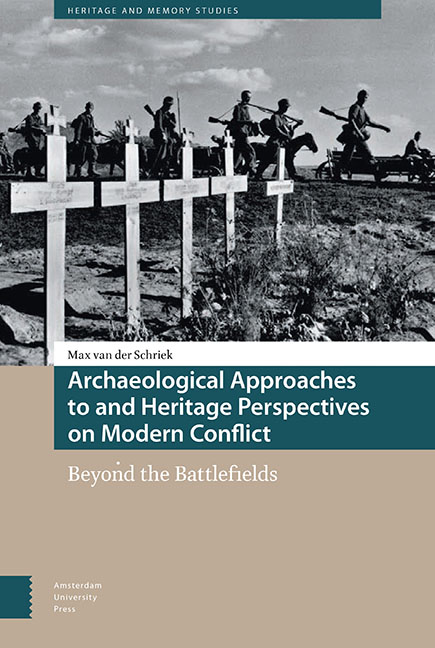Book contents
- Frontmatter
- Dedication
- Contents
- List of figures
- Acknowledgements
- 1 Introduction
- 2 Conflict archaeology
- 3 Landscape biographies of commemoration
- 4 Status quaestionis of conflict archaeology
- 5 Scientific and societal importance
- 6 The application of LiDAR-based DEMs
- 7 Summary and final debate
- Synopsis
- Appendix: WWII-related archaeological researches in the Netherlands (1984-2017)
- Bibliography
- Index
- Frontmatter
- Dedication
- Contents
- List of figures
- Acknowledgements
- 1 Introduction
- 2 Conflict archaeology
- 3 Landscape biographies of commemoration
- 4 Status quaestionis of conflict archaeology
- 5 Scientific and societal importance
- 6 The application of LiDAR-based DEMs
- 7 Summary and final debate
- Synopsis
- Appendix: WWII-related archaeological researches in the Netherlands (1984-2017)
- Bibliography
- Index
Summary
The study presented here is an analytical and technical exploration of the potential of conflict archaeology in the Netherlands. This study contains three implicit research goals. To start with, as explained in Chapter 1, this study is to be viewed as fundamental research with regard to an interdisciplinary approach consisting of heritage, archaeology and spatial development perspectives. Secondly, by assessing and validating the academic value of conflict archaeology in the Netherlands, it is a valuation study. And last, by implementing a non-invasive technique on sites of modern conflict to verify their condition and to map these remains, it can be considered methodological research. Explicit research goals were the development of archaeological research questions for conflict archaeology in the Netherlands. Is conflict-archaeological research possible at all? How can sites of recent conflict be identified? How essential is the availability of historical sources and should they always be validated? Do we need a special heritage policy for modern conflict-related sites? The intention is for readers to be able to understand the great potential of sites of modern conflict, their archaeological heritage and the necessity of further research.
One of the main drivers for modern conflict archaeology has been community interest, as demonstrated with the example of Mont Cornillet. Interest shown by the general public has been of major importance for the acceptance and development of conflict archaeology in many countries, including the United Kingdom, Belgium (in particular Flanders) and France. Conflict archaeology is firmly rooted in the Anglo-American world. For a long time, academic archaeologists only had a limited interest in the heritage and archaeology of landscapes of war. Although older conflict sites, ranging from prehistory up to Napoléonic times, were usually investigated within the framework of another sort of research, this has not often been labelled conflict archaeology. Various academic research projects, archaeological excavations and exhibitions would not have been possible without the increasing archaeological interest in the topic shown by the general public. The perception of archaeology focused on more recent eras, and conflict has changed significantly over the past decades.
Chapter 2 delves into the historical roots and theoretical background of conflict archaeology, outlining the three main categories of conflict: prehistoric, historic and modern.
- Type
- Chapter
- Information
- Archaeological Approaches to and Heritage Perspectives on Modern ConflictBeyond the Battlefields, pp. 289 - 298Publisher: Amsterdam University PressPrint publication year: 2022

